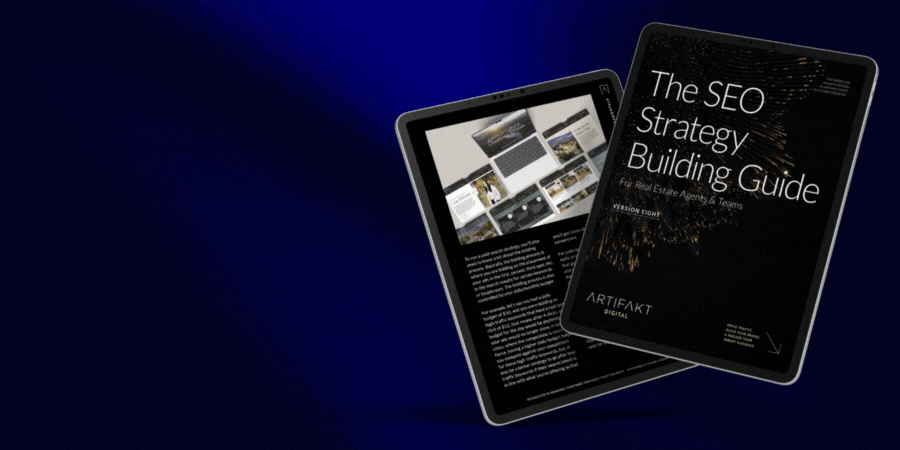Building a Well-Rounded Search Strategy Using Both Organic and Paid Sources

If you have a real estate website, you need people to find it; but for your website to be successful, you need it to be found by the right people, at the right time, for the right reasons.
If your website can’t be found online, there really isn’t much point in having one in the first place.
And that’s where your search strategy comes in. Your search strategy is the most effective way to make sure you get your website in front of your target audience.
★ Your search strategy is also closely tied to your online presence. To learn more about that, have a look at these posts:
- How to Build an Online Presence Strategy for Your Real Estate Brand
- How Your Real Estate Referral Business is Tied to Your Online Presence
- How to Effectively Monitor Your Brand’s Online Presence
Essentially, there are 2 main ways to bring in traffic to your website from your search strategy: one way is to be found in search results organically, and the other is to be found in search results through paid ads.
In most cases, a well-rounded search strategy involves being found in both organic and paid search sources, however, you should always focus on your organic search strategy first. Organic is, and always will be, the best traffic source you can get because it’s always more engaged, and ultimately, more likely to convert into a quality lead.
But once you have an organic search strategy in place, it makes sense to introduce paid search to build out a more well-rounded search strategy.
Before digging into the reasoning, let’s clarify what each is, and why it’s important to have both.
Organic Search: Being found organically is when someone uses a search engine (like Google), types something in, clicks the search button, and then finds your website in the search results and clicks through. In most cases, organic search doesn’t cost you money directly, and it has the added bonus of appearing more authentic and honest to the user, but it’s certainly a long-term play; it may take you years to build out a successful organic strategy, but ultimately, it’s worth the effort.
Paid Search: Being found through paid search is when someone uses a search engine, types something in, clicks the search button, and then clicks a link to your website in one of the ads within the search results. Depending on where you are and what your competition is like, paid search can be quite expensive, but it guarantees your place within the search results, often where it has the greatest potential to be clicked by someone.
Building An Organic SEO Strategy
Building a solid, successful, long-term organic SEO strategy takes a lot of time, a lot of hard work, and a lot of knowledge. But there are a few basic things you can do to ensure your site is as SEO-friendly as you can make it, even if you don’t know much about SEO.
An organic search strategy is primarily about determining what you want to rank for, if it’s possible to rank for it, and then putting in the work to rank for it. At the most basic level, the websites that rank for keywords are comprised of great content, backlinks, and high domain authority.
★ Want to learn more about these topics? Have a look at these posts:
- Establishing a Successful Marketing Mix In Your Website Acquisition Strategy
- Why You Need an External Link-Building Strategy for Your Real Estate Website
- How Being Authoritative Can Bring You More Quality Website Traffic
- Optimizing Your Content for Humans (And Not Just for Search Engines)
Despite what people may tell you, there is no quick and easy way to rank for a keyword for a long period of time. Ranking for keywords requires strategy, hard work, and patience.
Getting started involves understanding your audience and what they would search, and then setting up your website (and content strategy) to rank for those keywords and keyphrases. Keep in mind, the research around what is actually getting searched isn’t easy to do, but if you know nothing about SEO at all and want to build your organic search strategy as best you can, you can start by being honest and original with the content you’re creating, and start writing about topics that you think your target audience will be interested in.
At the end of the day, Google just wants to return the best results for whoever is searching, so by writing good, quality content consistently, you’ll have a better chance of being what Google is looking for in results.
One strategy you may want to try is developing a ‘pillar page’, which is a long, detailed, and well-developed main topic page with internal/external links, headlines, and more. From there, plan out your blog posts that build on and are related to that topic, and then link back to that page through your posts. For example, your pillar page could be: The Ultimate Guide to Selling a Home, and then your blog posts may be: The best time to sell your home, why you should use an agent to sell your home, 5 things people overlook when selling their home, etc. Each of those posts should link to the pillar page, and ultimately, work towards improving it’s authority.
★ Want to learn more about building pillar content? Have a look at these posts:
- Using Pillar Pages to Make Old Content More Accessible
- Why You Should Establish a Topic Cluster Strategy
The idea is that you’ll be building the authority of your page through the posts, and as well, provide the user with a lot more useful information. Also, if you can get other reputable websites to link back to your pillar page, that will help increase the authority and the ranking of your page, but quality is key here. For example, if your pillar page received a backlink from another real estate agent’s website, that would be great, but if it received a link back from a large authoritative website, like Zillow or RedFin, that’s a lot better as it shows that your pillar page is important and increases its authority.
★ Want to learn more about building an organic SEO strategy? Have a look at these posts:
- Writing Content for SEO as a Real Estate Agent
- Why Building Trust is a Key Part of a Successful SEO Strategy
- How to Start Building a Solid Real Estate Local SEO Strategy
- How ‘Dwell Time’ and Quality Content Work Together to Improve SEO
Building A Paid Search Strategy:
The first thing you should know about building a paid search strategy (through Google Ads) is that it’s quite complicated to do successfully, mostly because there are a lot of moving parts and complexities to understand. You’ll need to understand the setup process, keywords, bidding, and landing pages, but with all of that in place, a paid search campaign can be really effective when paired with a strong organic SEO strategy.
That’s because paid search offers something that most other online advertising doesn’t: it allows you to capitalize on intent.
When it comes to other forms of advertising, (like Facebook or Instagram) you have the ability to know a lot of things about the audience, like where they live and what they like, but you don’t know what they actually want to do because you don’t know their intent.
In paid search, you do know their intent, meaning, you know what they’re searching for and what they’re looking for, so you can capitalize on that in your advertising campaigns.
That being said, a great paid search strategy always starts with a great campaign, meaning, it isn’t as effective to simply put up some paid search ads and push the click-throughs to your homepage; you need to create something of value that answers the person’s search intent and drives them to a page that they can easily convert on.
For example, if you’re trying to get seller leads, you’d want to run a campaign specifically to address a seller’s pain points, like selling their home for more money or working with someone that makes the process easy, and then, you’d want to push those clicks to a landing page that talks more about how you solve those problems, as well as an easy way to convert by filling out a short form, calling, or sending an email.
To run a paid search strategy, you’ll also need to know a bit about the bidding process. Basically, the bidding process is where you are bidding on the placement of your ads in the first, second, third spot, etc, in the search results for certain keywords or keyphrases. The bidding process is also controlled by your daily/monthly budget.
For example, let’s say you had a daily budget of $50, and you were bidding on high-traffic keywords that have a cost-per-click of $12, that means after 4 clicks, your budget for the day would be depleted and your ads would no longer show. In larger cities, where the competition is more fierce, having a higher daily budget helps you compete against your competitors for those high-traffic keywords, but, it may be a better strategy to go after less-traffic keywords if their search intent is in line with what you’re offering so that you’ll get more clicks, and hopefully, more conversions.
★ Want to learn more about advertising? Have a look at this post called: Why Your Digital Advertising Strategy Might Not Get You Real Estate Leads.
For paid search, paying a lot of attention early on is really key. A well-run strategy that generates results needs constant attention and continual optimization to get the best results. Much like an organic SEO strategy, a good paid search strategy is never done.
Tying It All Together:
By building a well-rounded search strategy that uses both organic and paid sources, you’ll be covering all of your bases around search. You’ll be able to tailor your paid search strategy to ensure that your website displays in the search results that you don’t rank for organically, and vice versa.
Want to learn more about SEO and get more traffic to your website? Our SEO Strategy Building Guide is a mix of curated content and self-guided workbook that will help provide insight on how you can build and implement a modern SEO and overall search strategy.





















